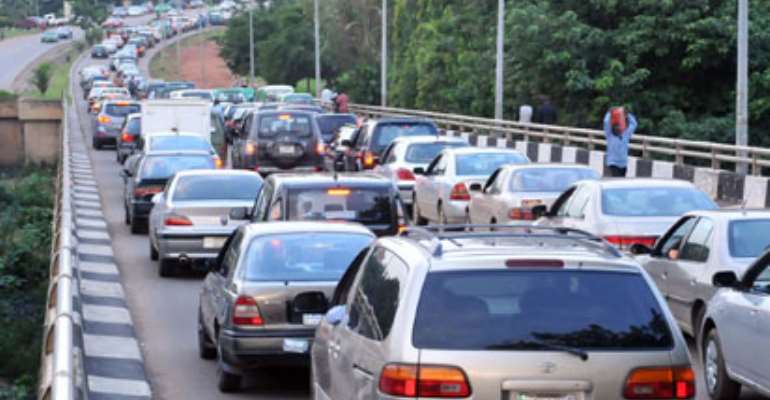Olawale Rotimi-Opeyemi: Is Street Begging Becoming A Profession In Nigeria?

The cultural, religious, political and economic factors in Nigeria encourage street begging in Nigeria. On the basis of culture and religion, giving alms is pivotal to receiving help from the supernatural being, becoming prosperous and enjoying longevity of life.
On the other hand, the persistent political and economic instability and hardship in Nigeria has seriously marginalized the Nigerian society, while a few are extremely rich, more people are very poor and hopeless, thus they resolve to begging.
Street begging is intrinsic to the Nigerian society, beggars are surplus and seen everywhere across the country; at hotel gates, bank car parks and ATM points, government offices gates, worship centers, motor parks, walk ways, junctions, eateries, schools, malls, markets, traffic, ceremonies gas stations, commercial buses among others.
Street beggars in their exploding number have become an integral composition of Nigerian society, government efforts in the past to remove them from public scenes have failed many times. In 2015, street beggars played defiance in Kaduna state, ignored the order banning street begging as issued by the State Governor and returned to the streets.
Street begging in Nigeria has taken various dimensions over the years, at the initial, only disabled persons are found on the streets begging for alms. However, since the last decade, more and more abled persons, young and old, men and women have resolved to begging. Statistics of a study of 183 beggars and destitutes in Lagos is presented majority of the beggars were Hausa and their religion was Muslim. Some of them migrated to other parts of Nigeria to beg for alms. However, other tribes such as Yoruba and Igbo are also have represented in the beggars communities.
There are different types of beggars in Nigeria, I have tried to classify them into three categories. Common Beggars, Corporate Beggars and Circumstantial Beggars. Common beggars are the day to day street beggars seen in the traffic, mall gates, bank gates, motor parks e.t.c looking rough and dirty, usually they are disabled whether natural or artificial. Corporate beggars are not noticed, they are well dressed, and set out to important areas of the cities (banks, government offices, events etc) usually with a folder in their hands. "Excuse me sir/ma" "hello brother/sister" "hello daddy/mummy" these are their common ways of salutation. They approach you calmly and tell you how they lost their wallet, then solicit for financial support to return to their home. Circumstantial beggars are well dressed also but come looking frail and worried, they tell you how their father, mother or siblings have been in critical state in the hospital and now between life and death. They speak to the emotions of people to get money. Often, same faces appear daily with different stories.
Common beggars have locations where they resume daily, they are prompt and punctual, they wake and set out to city centers early before workers set out and economic transactions begin for the day. Usually, they do not have price tag, they receive whatever you give irrespective of the amount. However, corporate and circumstantial beggars come with price tag, after presenting their stories, they tell you the exact amount they want you to give them, it's comes as a proposal so you can decide to give less.
A study by Osa-Edoh Gloria and Ayano Samuel on the causes and consequences of street begging in Nigeria show that poverty (76.8%) and rejection by family harsh weather (94.2%), as the worst consequence of begging. The study also revealed respondents’ most important Economic/Psychosocial needs as Money (88.5%), learning a trade (80.8%), Healthcare (71.2%) and Accommodation (55.7%). Apparently, Nigeria's economic instability is a major catalyst that increased street beggars in Nigeria.
Beggars have become part of Nigeria's workforce. While you see them as beggars, they see themselves as workers, professionals. They resume to their duties as early as 4am at motor parks while they close duty as late as 10-11pm daily. In an open interaction with 10 beggars, they referred to begging as "aiki" and "ise" which means "work" in Hausa and Yoruba languages. One of them have sponsored himself to Saudi Arabia for pilgrimage with money made from street begging. Averagely, they all agreed they go home with minimum of 5000 daily ( 20 dollars). When asked if they would stop street begging if they receive financial empowerment from government, they all said no. This shows the profitability of their profession.
Based on interaction with ten beggars, it is not difficult to know that some beggars are richer than those who give them alms. To strengthen and protect their profession, they have formed an association named Beggars Association of Nigeria (BAN) which they use to advocate for better place for beggars in the Nigerian society. Streets beggars have succeeded in solidifying begging as a profession in Nigeria.
Olawale Rotimi-Opeyemi is a prolific writer and journalist in Nigeria. He can be reached via [email protected] or +2348105508224
